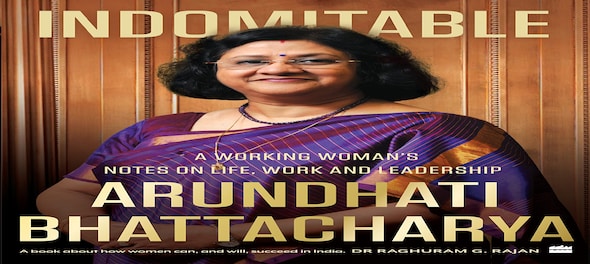
Reading this book reminded me of the first one that we reviewed on Bookstrapping - The Chancellor: The Remarkable Odyssey of Angela Merkel by Kati Marton. Arundhati Bhattacharya comes across as tenacious and formidably unexcitable; just like Chancellor Merkel.
The book tells you that she survived comic horrors like receiving a marriage proposal at the age of 27, from someone who wanted to marry her to get a loan to buy a flat. Ha ha! Let me clutch my tummy and laugh heartily.
As you turn the pages, you learn that Arundhati Bhattacharya’s genetic pool reeks of quality - her mother was a capable, lifelong learner. She was skilled at gardening (she received a prize from Nikita Krushchev no less) as well as homeopathy. Mommy also dispensed some solid wisdom, “Books have within them many answers, but we must seek them out.”
Her committed father had a PSU background; one of Arundhati’s regrets is that she waited to meet her father face to face to tell him about her promotion to AGM at SBI, but he passed away before that could happen. Another rare regret concerns a colleague’s suicide. But overall, the book is very endearing, in the words of Deepak Parekh, who has penned the foreword.
Five gems from the book.
1. Arundhati was once slapped by her math teacher in 4th grade. She went on to flunk her quarterly exams and learnt a valuable lesson - different rewards and punishments are suitable for different people. She never forgot this on her way to becoming the Chairman of State Bank of India.
2. She had a ‘no TV’ upbringing. Other than places like Bhilai, Bokaro and Kolkata, all she saw was books during her growing up years and her father always had money to spare to buy books. She grew up in times when Hindi movies were considered a corrupting influence and simple living was encouraged (Rajesh Khanna and Sharmila Tagore’s Aradhana was her first theatre experience.)
3. Can you imagine her being naughty? When faced with a particularly disdainful junior Warden during her hostel days, she schemed with four other girls to lock the lady up! This called for some vicious, clandestine planning and carefully oiling the hinges of the warden’s doors for several days. Bite me!
4. When she joined SBI as a probationary officer, she was handed over a newspaper roll with puffed rice and roasted peanuts and free advice - “whenever you feel hungry eat a little bit, because it is a high pressure job.” This advice was immensely helpful. One day, troublesome union leaders tried to close her branch on the pretext that the ‘staff was suffocating and it wasn't the job of the security guards to open windows.’ She promptly declared that as the branch manager, it wasn't beneath her to do it. Marching forward, she opened the windows and work resumed.
5. Particularly touching parts of the book are those where she talks about raising a premature child with delayed milestones. Along the way, she is brutally honest about the conflict between motherhood and her career. She declares that maids are more precious than diamonds. Now ask any woman how much we love her for saying this!
Arundhati has seen far flung SBI branches with no electricity. Later in her career, this gave her a very different appreciation for technology. Her grit and resolve to become financially independent early - by giving tuitions to weak students - helped her prepare better for the banking entrance exams.
Yes, the slapstick tragedy is that she did get transferred to a new post, every time she found a ‘good tailor for her saree blouse’ and a good hairdresser! But this MA in English literature, who at one point was training to be a journalist and ended up elsewhere, has opened up about her vulnerabilities. In a world where women, do not come forward to write their biographies for the fear of being judged - lets doff our hat to indomitable.
Reeta Ramamurthy Gupta is a columnist, biographer and bibliophile. She is credited with the internationally acclaimed Red Dot Experiment, a decadal six-nation study on how ‘culture impacts communication.’ Views expressed are personal.
(Edited by : Kanishka Sarkar)
Check out our in-depth Market Coverage, Business News & get real-time Stock Market Updates on CNBC-TV18. Also, Watch our channels CNBC-TV18, CNBC Awaaz and CNBC Bajar Live on-the-go!


Lok Sabha Election 2024: Gurugram gears up for crucial polls amidst economic boom and civic woes
Apr 24, 2024 11:41 PM
Lok Sabha Election 2024: Crucial seats up for grabs as Rajasthan, Maharashtra, Bihar gear up for 2nd phase of polls
Apr 24, 2024 11:40 PM

